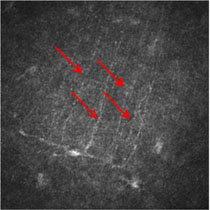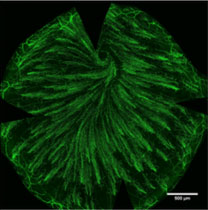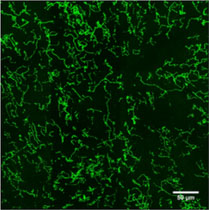Welcome to the Yorek Lab!
Research
The Yorek lab's research focuses primarily on vascular and neural disease related to obesity and diabetes. We are interested in determining the etiology of peripheral neuropathy associated with these conditions. An overall goal of our studies is to determine the role of vascular dysfunction in obesity- and diabetic-induced peripheral neuropathy and the mechanism responsible for vascular dysfunction. Briefly, the group has developed the methodology to examine the effect of diabetes on vasodilation of blood vessels that provide circulation to the sciatic nerve and the retina. Combined with the examination of motor and sensory nerve conduction velocity, neuronal blood flow in the sciatic nerve, and sensory nerve perception we are investigating the etiology of diabetic neuropathy with emphasis on vascular disease.
Visualization of Corneal Nerves

|

|

|
In addition, we have also been conducting studies examining impairment of innervation of the cornea as a marker for obesity- and diabetic-neuropathy. Using animal models of obesity and diabetes our group has demonstrated that loss of corneal nerves especially those innervating the cornea epithelium occurs early in disease. We have also shown that in the sub-epithelial layer of the cornea early detection of nerve loss can be achieved by examining the region of the whorl. These results have translational importance for the early detection of obesity- and diabetic-induced peripheral neuropathy that could be used for examining the progression and repair of neuropathy in patients. In this regard the lab has been conducting studies in the use of menhaden oil (fish oil), a natural source for n-3 fatty acids, for the treatment of obesity- and diabetic-induced peripheral neuropathy. Our studies have demonstrated that treating rodent models of pre-diabetes and types 1 and 2 diabetes with menhaden oil improves insulin resistance and vascular and neural complications.
We have also shown that treating type 2 diabetic mice with resolvin D1 can improve diabetic peripheral neuropathy. We believe that the mechanism(s) responsible for the beneficial effects of menhaden oil is the reduction in inflammatory stress and production of resolvins and neuroprotectin, metabolites of n-3 fatty acids that have anti-inflammatory and neuroprotection properties. Studies are ongoing to investigate the mechanism(s) responsible for the beneficial effects of fish oils in obesity and diabetes. In addition clinical studies are being designed to test the benefits of fish oil treatment in subjects with diabetes.
Collaborators
- Randy Kardon (Univ of Iowa)
- Charlie Brenner (Univ of Iowa)
- Arthur Vinik (EVMS)
- Eva Feldman (Univ of Michigan)
- Rodica Pop-Busui (Univ of Michigan)
- Nigel Calcutt (UCSD)
- Maria Grant (Indiana Univ.)
- Kathy Lamping (Univ of Iowa)
- Bill Sivitz (Univ of Iowa)
- Ann Marie Schmidt (NYU)


